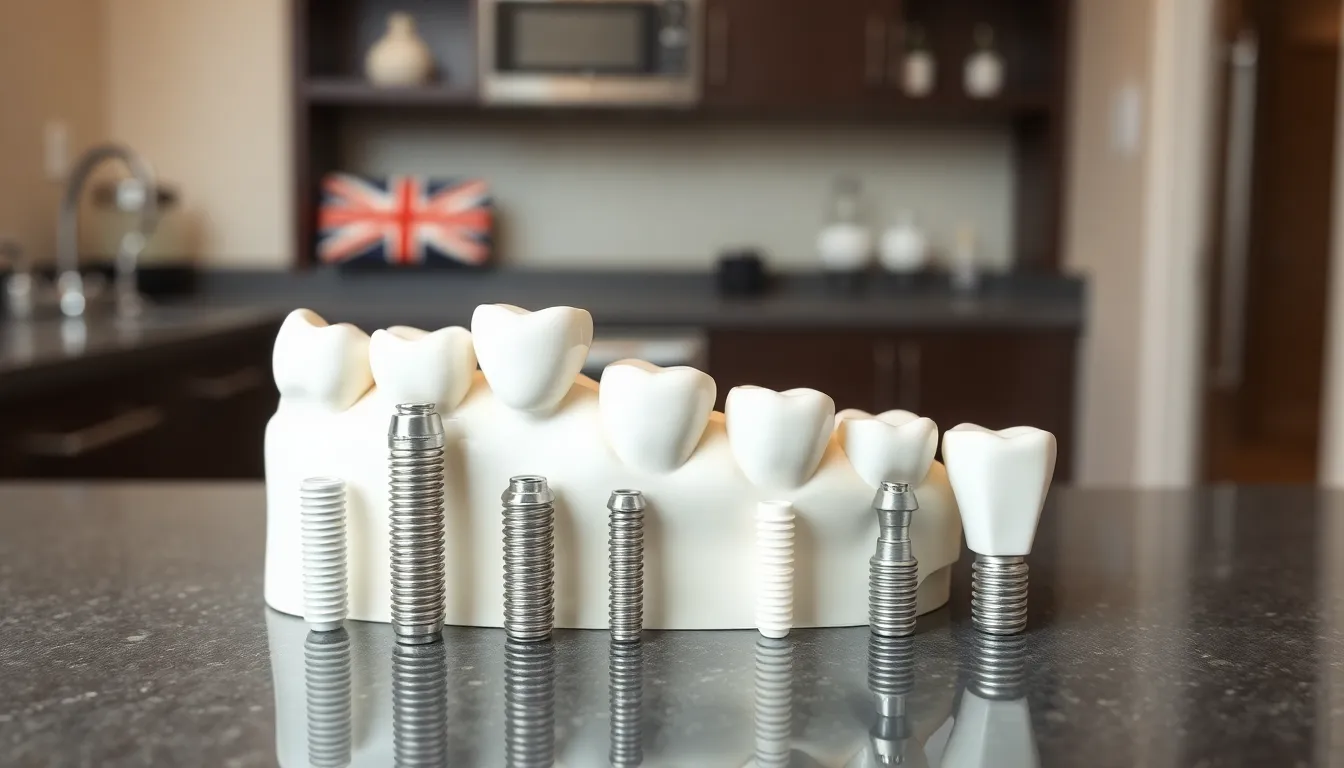When it comes to dental implants, the cost can feel like a trip to a fancy restaurant where you only ordered the breadsticks. One minute you’re munching on a delightful meal, and the next, you’re staring at a bill that could make your wallet weep. But fear not! Understanding the price of a single tooth implant doesn’t have to be as painful as a root canal.
Table of Contents
ToggleOverview of Tooth Implants
Tooth implants provide a permanent solution for missing teeth. These dental devices offer stability and support, enhancing both function and aesthetics.
What Is a Tooth Implant?
A tooth implant consists of a small titanium post inserted into the jawbone. This post acts as a root for a replacement tooth, securely anchoring it in place. After the insertion, osseointegration occurs, allowing the bone to fuse with the implant. Over time, this process creates a strong foundation for the artificial tooth. Various materials may be used for the crown, including porcelain or ceramic, mimicking natural teeth. No other dental replacement offers such a long-lasting solution with proper care.
Benefits of Tooth Implants
Tooth implants deliver several advantages compared to other options. They enhance speech, as patients can speak clearly without worrying about slipping dentures. Improved comfort ranks high, as implants function like natural teeth. Oral health benefits include preserving the jawbone and preventing adjacent teeth from shifting. Additionally, implants offer durability, with a lifespan of 10 to 15 years or longer when maintained properly. Patients often appreciate the aesthetic value, as implants closely resemble natural teeth.
Factors Influencing Cost

Several factors contribute to the overall cost of a single tooth implant. Understanding these elements helps clarify why prices can vary significantly.
Type of Dental Implant
Different types of dental implants impact cost. Traditional implants, often made from titanium, typically offer a reliable and durable option. Zirconia implants, while more aesthetic, often come with a higher price tag due to their material. Mini implants, designed for narrower spaces, present a lower-cost alternative but may not be suitable for all cases. Patients often find that the type chosen influences both the procedure costs and long-term maintenance expenses.
Geographic Location
Geographic location plays a significant role in pricing. Urban areas tend to show higher costs compared to rural settings, driven by demand and overhead expenses in cities. Variations also exist between states, as local market conditions dictate pricing structures. For instance, implants in California may cost more than those in Texas due to differences in living costs. Patients should consider location when planning for their dental implant investments.
Dentist’s Experience
A dentist’s experience significantly influences implant costs. Highly skilled specialists often charge more due to their advanced training and expertise. Complex cases requiring additional procedures may necessitate the services of an oral surgeon, further increasing overall expenses. Patients might benefit from choosing experienced dentists, as their proficiency can also impact the success rate of the procedure. Balancing cost with skill is essential for optimal outcomes.
Cost Breakdown
Understanding the cost of a single tooth implant involves several components. Each part contributes to the overall expense and helps patients prepare financially.
Initial Consultation Fee
The initial consultation fee typically ranges from $100 to $300. This fee covers an assessment of oral health, eligibility for implants, and detailed imaging, such as X-rays or CT scans. Dentists evaluate the condition of the jawbone and overall dental structure during this appointment. This assessment plays a crucial role in determining the best approach for the implant procedure. Consulting with multiple providers can help patients compare fees and find a suitable option.
Surgery Costs
Surgery costs for a single tooth implant generally range from $3,000 to $4,500. This expense includes the dental implant placement, anesthesia, and any necessary preliminary procedures, such as bone grafting. The complexity of the case influences the price, especially for patients requiring extensive preparatory work. Factors like location also affect surgery costs, with urban practices often charging more due to higher operating expenses. Patients should inquire about payment plans or financing options to manage these costs effectively.
Post-Operative Care
Post-operative care ranges from $150 to $500, depending on individual needs and follow-up appointments required. This care includes monitoring for infection, managing pain, and ensuring proper healing of the implant site. Follow-up visits may involve adjustments or additional treatments to achieve optimal results. Dentists typically provide personalized instructions for at-home care, which contributes to the success of the implant. Investing in post-operative care directly impacts the longevity and functionality of the implant.
Insurance and Financing Options
Understanding insurance coverage and financing plans for dental implants can reduce financial stress. Many dental insurance policies include partial coverage for implants.
Insurance Coverage for Implants
Dental insurance often does not cover the full cost of implants. Coverage may range from 10% to 50% based on individual plans. Some plans classify implants as a cosmetic procedure, resulting in limited benefits. Patients should review their policies and consult with their insurance providers for specific details. In certain cases, a dentist may provide documentation to help justify coverage. Some insurance companies may require prior authorization before proceeding with implant surgery. Knowing these factors helps patients maximize their available benefits.
Financing Plans Available
Several financing options exist for patients seeking dental implants. Many dental practices offer in-house financing with low or no interest plans. Third-party lenders provide additional payment options. Plans typically allow patients to spread costs over several months, making it more manageable. Monthly payments often range from $100 to $300, depending on the total cost and terms. Flexible payment plans enhance accessibility for those without insurance coverage. Exploring all financing options can empower patients to proceed with necessary dental procedures without immediate financial burden.
Investing in a single tooth implant can seem overwhelming at first glance. However understanding the various components of the cost can make the process more manageable. Patients should consider factors like implant type location and the dentist’s expertise when evaluating their options.
Exploring insurance coverage and financing solutions can further ease financial concerns. With the right information and support patients can make informed decisions that lead to improved oral health and lasting benefits. Embracing this journey not only restores smiles but also enhances overall well-being.








